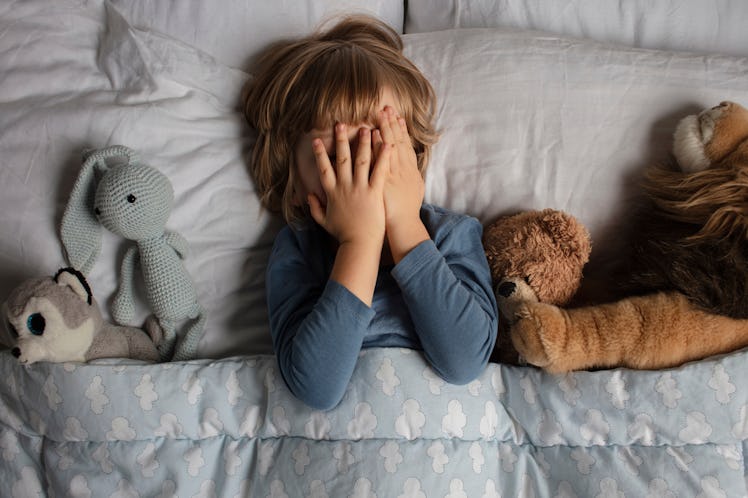Kids Who Get Less Than 9 Hours Of Sleep Suffer Greatly, Study Shows
Scientists are still trying to figure out whether the damage is long-term.

A new study published in the Lancet Child & Adolescent Health shows that children between the ages of six and 12 who get less than the recommended nine hours of sleep every night can have impaired cognitive wellbeing, including less memory, problem-solving, and rational decision-making abilities than their peers who sleep more.
Getting enough sleep is important for everybody. Young children are no exception, as experts recommend that kids between the ages of six and 12 sleep from nine to 12 hours each night.
“Because the adolescent brain is still under rapid development, sustained sleep deficits may lead to permanent impairment to the brain and to the cognitive functions,” Ze Wang, professor of diagnostic radiology at the University of Maryland School of Medicine and lead author of the paper, tells Fatherly. “Getting good sleep back is crucial to teens' brain and mental health.”
What Did The Study Find?
Researchers at the University of Maryland School of Medicine enrolled over 8,200 nine- and ten-year-old kids. The scientists had the children go through MRI scans in order to collect imaging information on their brains. They also looked at the children’s medical records, and had them and their parents fill out questionnaires to learn more about their sleeping patterns.
The results suggested that children who slept less than nine hours a night had less grey matter — or brain volume — in the areas of the brain related to memory, emotional control, and attention.
The imaging also showed that the sleep-deprived cohort had differences for 93 out of 306 of the neuronal connections for such cognitive functions, so their neurons in those areas weren’t firing as well.
Kids who slept less also did worse on tests for 42 behavioral measurements, such as aggression and rule-breaking, intelligence, and psychosis or impulsivity. Sleep deficit is therefore impacting the teens’ brain both structurally and functionally, Wang says.
Is The Damage Long Term?
When a check-up was conducted one and two years later, the cognitive deficits persisted, giving the scientists reason to believe that unhealthy sleeping habits can result in long-term issues for children’s health. In fact, over time, these cognitive deficits are also associated with mental health problems such as depression and anxiety.
“One possible consequence is the harm to behavior, mental health, and cognition, which may reciprocally impact sleep quality and start a worse-to-worse cycle,” says Wang. “We expected part of the results such as the brain level and behavioral level effects, but did not expect that the effects were so stable given the fact that adolescence brain is still under rapid development and maturation.”
Wang’s team can’t actually know, as of now, whether there’s any way to reverse this damage — but this shouldn’t be too much of a concern for parents, he says.
“The effects are considered modest so they should be able to be improved and reversed by changing the sleep habits and patterns,” says Wange. “What really concerns is the long-lasting phenomenon which suggests that if sufficient sleep is not recovered, these effects may sustain and may accumulate, leading to bigger and stronger cognitive and mental effects.”
Data from the study does however suggest that as the teenage years progress, even those who did get enough sleep when they were younger start to sleep less. In fact, parents should try to get their children to sleep the recommended amount or more.
How To Help Your Kid Get Enough Sleep
You might want to start by talking to your children about how important sleep is, and make it a family priority and activity you carry out together and respect together. Also, try to keep it regular, and create a habit and routine out of sleeping regularly.
“Do not frequently change the circadian rhythm,” says Wang. “Carry out procedures such as meditation to reduce stress and anxiety.” In fact, make sure your children are getting enough outdoor time and sports time during the day, as well as a healthy learning and activity schedule.
Have a “warm bath or shower before bed for relaxation,” suggests Lauri Leadley, a clinical sleep educator at Valley Sleep Center who was not involved in this research. “Limit sugars. Eating sugar causes your blood sugar to rise rapidly. This can result in an energy boost.”
Last but not least, get them away from screens in the evening: avoiding blue light is recommended, as it has been scientifically proven to disrupt sleeping patterns. “Screen time signals your brain to wake up when it should be winding down,” says Leadley. “Instead, we recommend journaling. An hour before bed, have the kids journal their fears and worries and then conclude the journaling session by jotting down 3 things they are grateful or happy about.”
Wang’s team will be using the pandemic as an opportunity to re-evaluate the effects of sleep — since the pandemic has changed the kids’ sleep patterns including bedtime and duration. Plus, since it’s mental issues that may reciprocally affect sleep, the researchers will be looking into that reverse effect too.